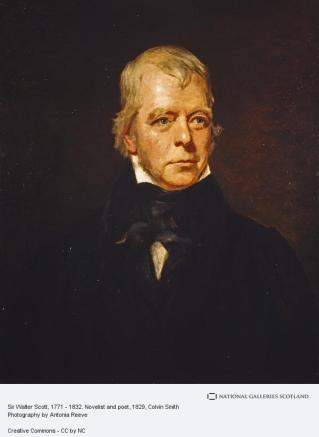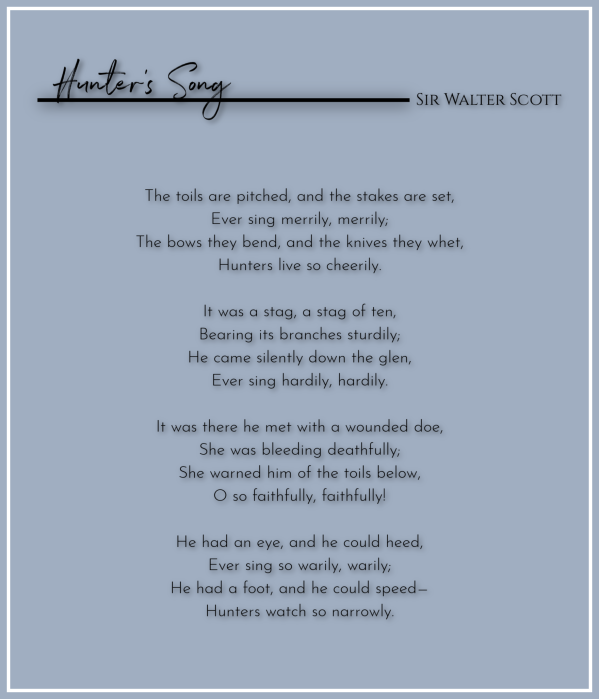
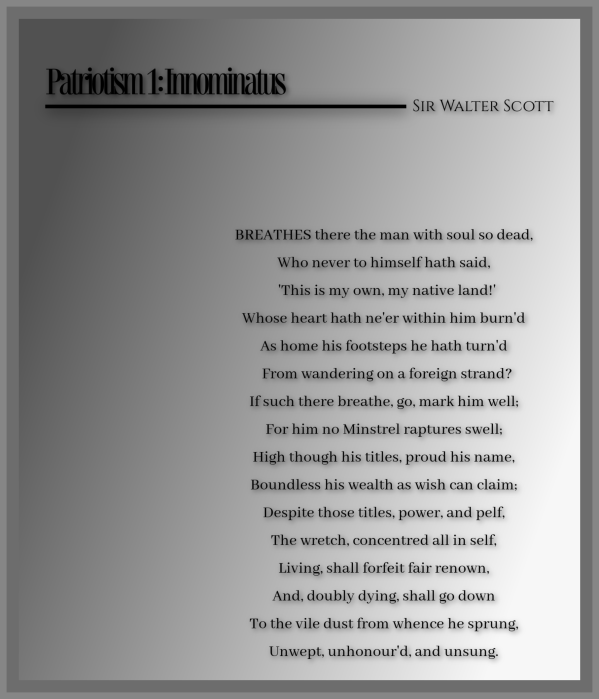
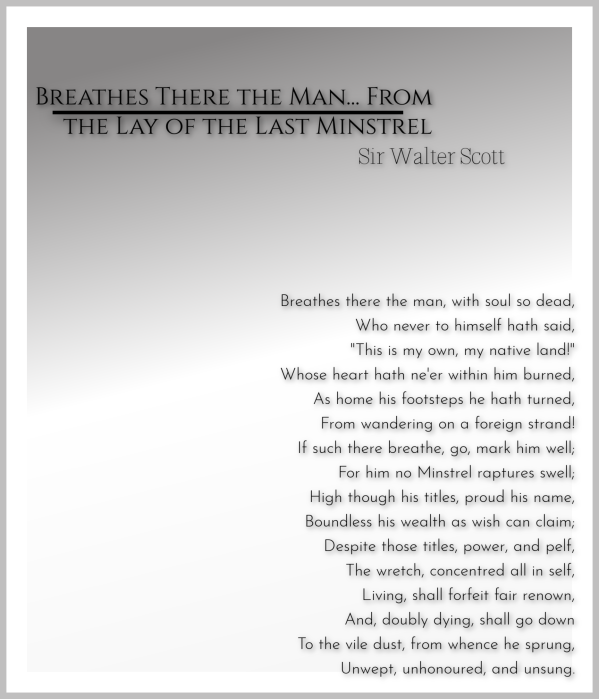
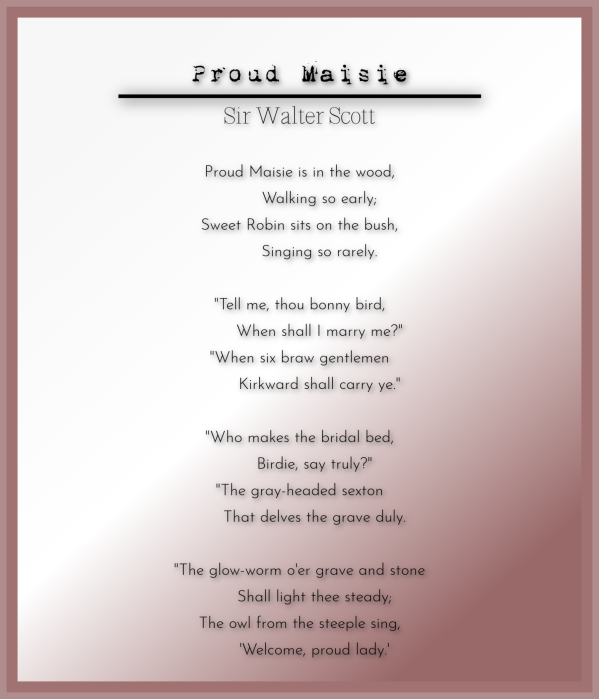
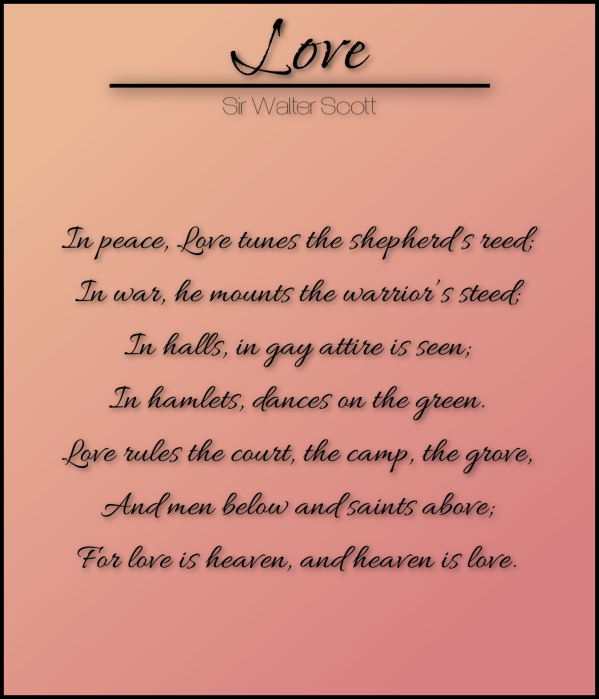
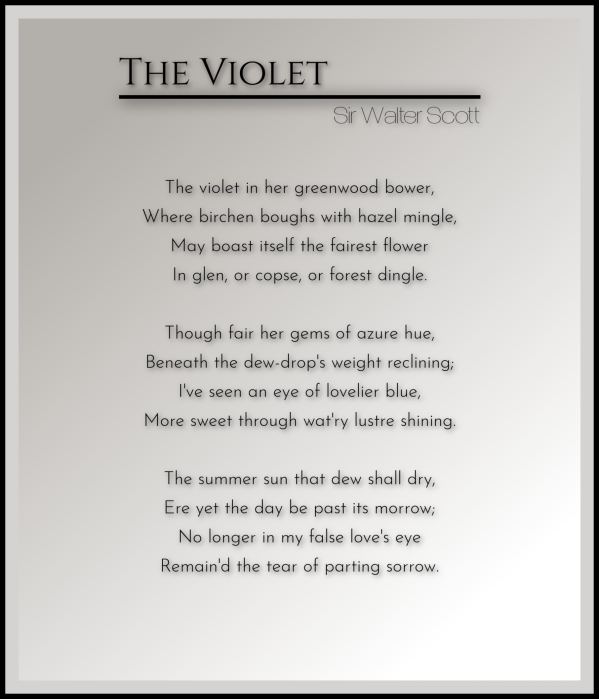
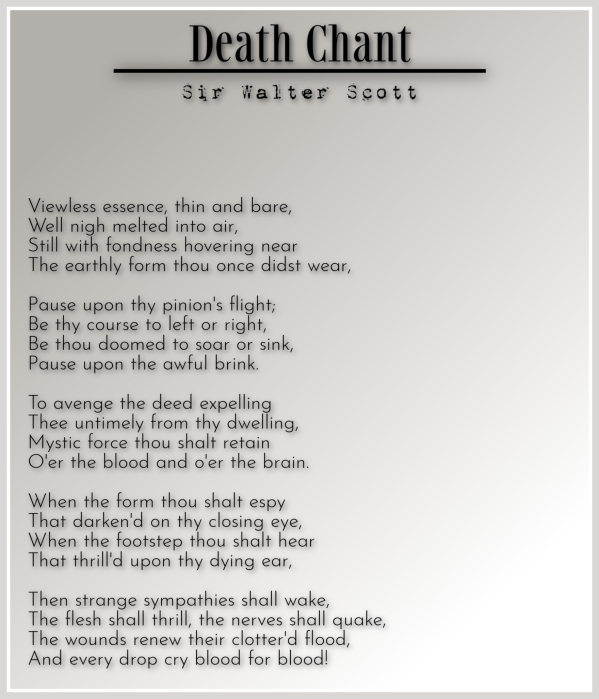
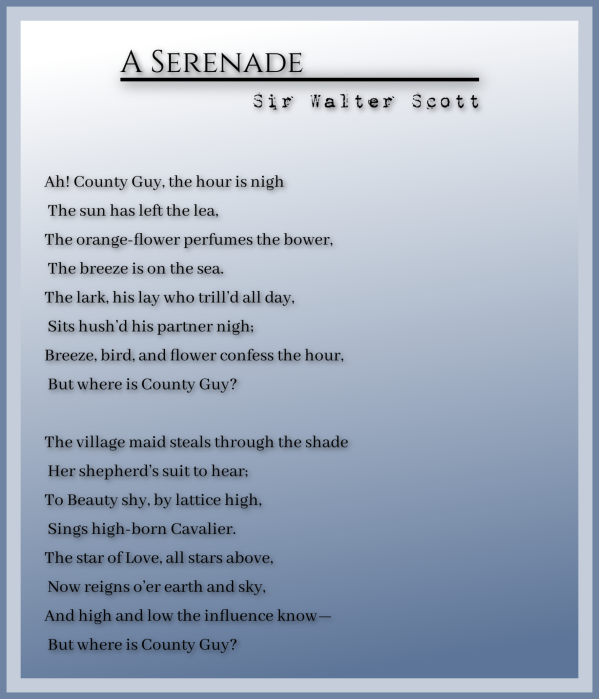
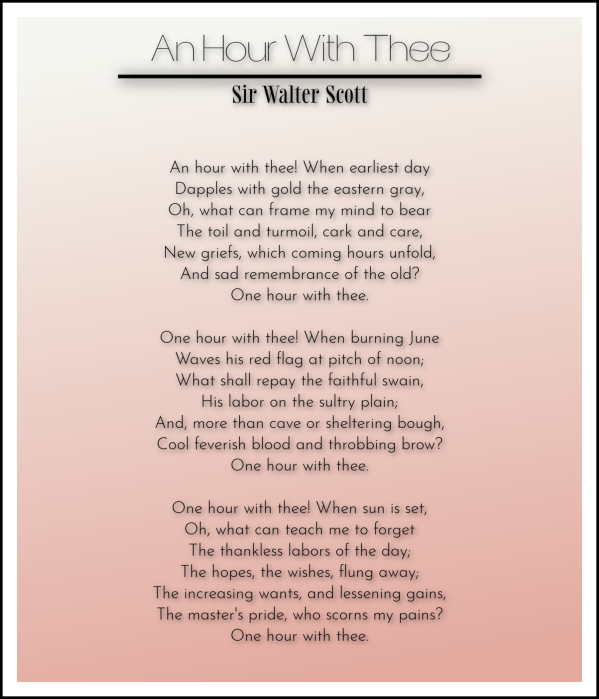
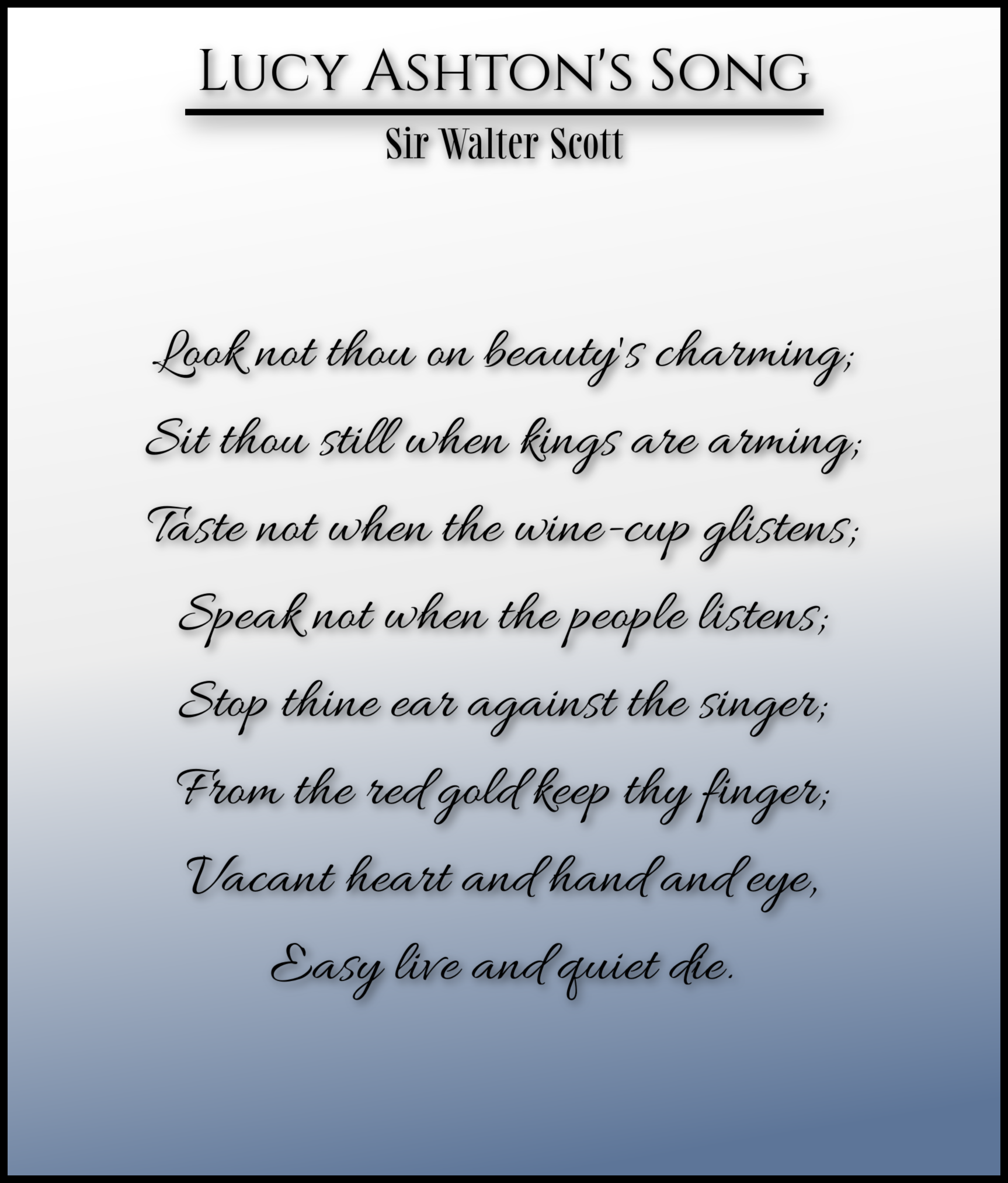
Lochinvar
O, young Lochinvar is come out of the west,
Through all the wide Border his steed was the best;
And save his good broadsword, he weapons had none,
He rode all unarm'd, and he rode all alone.
So faithful in love, and so dauntless in war,
There never was knight like the young Lochinvar.
He staid not for brake, and he stopp'd not for stone,
He swam the Eske river where ford there was none;
But ere he alighted at Netherby gate,
The bride had consented, the gallant came late:
For a laggard in love, and a dastard in war,
Was to wed the fair Ellen of brave Lochinvar.
So boldly he entered the Netherby Hall,
Among bride's-men, and kinsmen, and brothers, and all:
Then spoke the bride's father, his hand on his sword,
(For the poor craven bridegroom said never a word,)
"O come ye in peace here, or come ye in war,
Or to dance at our bridal, young Lord Lochinvar?"—
"I long woo'd your daughter, my suit you denied;—
Love swells like the Solway, but ebbs like its tide—
And now am I come, with this lost love of mine,
To lead but one measure, drink one cup of wine.
There are maidens in Scotland more lovely by far,
That would gladly be bride to the young Lochinvar."
The bride kiss'd the goblet; the knight took it up,
He quaff'd off the wine, and he threw down the cup.
She look'd down to blush, and she look'd up to sigh,
With a smile on her lips, and a tear in her eye.
He took her soft hand, ere her mother could bar,—
"Now tread we a measure!" said young Lochinvar.
So stately his form, and so lovely her face,
That never a hall such a galliard did grace;
While her mother did fret, and her father did fume,
And the bridegroom stood dangling his bonnet and plume;
And the bride-maidens whisper'd, " 'Twere better by far
To have match'd our fair cousin with young Lochinvar."
One touch to her hand, and one word in her ear,
When they reach'd the hall-door, and the charger stood near;
So light to the croupe the fair lady he swung,
So light to the saddle before her he sprung!
"She is won! we are gone, over bank, bush, and scaur;
They'll have fleet steeds that follow," quoth young Lochinvar.
There was mounting ’mong Graemes of the Netherby clan;
Fosters, Fenwicks, and Musgraves, they rode and they ran:
There was racing and chasing, on Cannobie Lee,
But the lost bride of Netherby ne'er did they see.
So daring in love, and so dauntless in war,
Have ye e'er heard of gallant like young Lochinvar?
Marmion: a Christmas Poem
Heap on more wood! the wind is chill;
But let it whistle as it will,
We'll keep our Christmas merry still.
Each age has deem'd the new-born year
The fittest time for festal cheer:
Even, heathen yet, the savage Dane
At Iol more deep the mead did drain;
High on the beach his galleys drew,
And feasted all his pirate crew;
Then in his low and pine-built hall
Where shields and axes deck'd the wall
They gorged upon the half-dress'd steer;
Caroused in seas of sable beer;
While round, in brutal jest, were thrown
The half-gnaw'd rib, and marrow-bone:
Or listen?d all, in grim delight,
While Scalds yell'd out the joys of fight.
Then forth, in frenzy, would they hie,
While wildly loose their red locks fly,
And dancing round the blazing pile,
They make such barbarous mirth the while,
As best might to the mind recall
The boisterous joys of Odin's hall.
And well our Christian sires of old
Loved when the year its course had roll'd,
And brought blithe Christmas back again,
With all his hospitable train.
Domestic and religious rite
Gave honour to the holy night;
On Christmas Eve the bells were rung;
On Christmas Eve the mass was sung:
That only night in all the year,
Saw the stoled priest the chalice rear.
The damsel donn'd her kirtle sheen;
The hall was dress'd with holly green;
Forth to the wood did merry-men go,
To gather in the mistletoe.
Then open'd wide the Baron's hall
To vassal, tenant, serf and all;
Power laid his rod of rule aside
And Ceremony doff'd his pride.
The heir, with roses in his shoes,
That night might village partner choose;
The Lord, underogating, share
The vulgar game of "post and pair".
All hail'd, with uncontroll'd delight,
And general voice, the happy night,
That to the cottage, as the crown,
Brought tidings of salvation down.
The fire, with well-dried logs supplied,
Went roaring up the chimney wide;
The huge hall-table's oaken face,
Scrubb'd till it shone, the day to grace,
Bore then upon its massive board
No mark to part the squire and lord.
Then was brought in the lusty brawn,
By old blue-coated serving-man;
Then the grim boar's head frown'd on high,
Crested with bays and rosemary.
Well can the green-garb'd ranger tell,
How, when, and where, the monster fell;
What dogs before his death to tore,
And all the baiting of the boar.
The wassel round, in good brown bowls,
Garnish'd with ribbons, blithely trowls.
There the huge sirloin reek'd; hard by
Plum-porridge stood, and Christmas pie;
Nor fail'd old Scotland to produce,
At such high tide, her savoury goose.
Then came the merry makers in,
And carols roar'd with blithesome din;
If unmelodious was the song,
It was a hearty note, and strong.
Who lists may in their mumming see
Traces of ancient mystery;
White shirts supplied the masquerade,
And smutted cheeks the visors made;
But, O! what maskers, richly dight,
Can boast of bosoms half so light!
England was merry England, when
Old Christmas brought his sports again.
'Twas Christmas broach'd the mightiest ale;
'Twas Christmas told the merriest tale;
A Christmas gambol oft could cheer
The poor man's heart through half the year.
Bruce and the Abbot
The Abbot on the threshold stood,
And in his hand the holy rood:
Then, cloaking hate with fiery zeal,
Proud Lorn first answered the appeal; —
"Thou comest, O holy man,
True sons of blessed church to greet,
But little deeming here to meet
A wretch, beneath the ban
Of Pope and Church, for murder done
Even on the sacred altar-stone!—
Well mayst thou wonder we should know
Such miscreant here, nor lay him low,
Or dream of greeting, peace, or truce,
With excommunicated Bruce!
Yet will I grant to end debate,
Thy sainted voice decide his fate."
The Abbot seemed with eye severe
The hardy chieftain's speech to hear;
Then on King Robert turned the Monk, —
But twice his courage came and sunk,
Confronted with the hero's look;
Twice fell his eye, his accents shook;
Like man by prodigy amazed,
Upon the King the Abbot gazed:
Then o'er his pallid features glance
Convulsions of ecstatic trance;
His breathing came more thick and fast,
And from his pale blue eyes were cast
Strange rays of wild and wandering light;
Uprise his locks of silver white,
Flushed is his brow; through every vein
In azure tide the currents strain,
And undistinguished accents broke
The awful silence ere he spoke.
"De Bruce! I rose with purpose dread
To speak my curse upon thy head,
And give thee as an outcast o'er
To him who burns to shed thy gore; —
But, like the Midianite of old,
Who stood on Zophim, heaven-controlled,
I feel within mine aged breast
A power that will not be repressed.
It prompts my voice, it swells my veins,
It burns, it maddens, it constrains! —
De Bruce, thy sacrilegious blow
Hath at God's altar slain thy foe:
O'er mastered yet by high behest,
I bless thee, and thou shalt be blessed!"
He spoke, and o'er the astonished throng
Was silence, awful, deep, and long.
Again that light has fired his eye,
Again his form swells bold and high,
The broken voice of age is gone,
'Tis vigorous manhood's lofty tone: —
"Thrice vanquished on the battle plain, —
Thy followers slaughtered, fled, or ta'en, —
A hunted wanderer on the wild,
On foreign shores a man exiled,
Disowned, deserted, and distressed, —
I bless thee, and thou shalt be blessed!
Blessed in the hall and in the field,
Under the mantle as the shield.
Avenger of thy country's shame,
Restorer of her injured fame,
Blessed in thy sceptre and thy sword, —
De Bruce, fair Scotland's rightful Lord,
Blessed in thy deeds and in thy fame,
What lengthened honors wait thy name!
In distant ages, sire to son
Shall tell thy tale of freedom won,
And teach his infants, in the use
Of earliest speech, to falter Bruce.
Go, then, triumphant! sweep along
Thy course, the theme of many a song!
The Power, whose dictates swell my breast,
Hath blessed thee, and thou shalt be blessed!"
The Song of the Tempest
Stern eagle of the far north-west,
Thou that bearest in thy grasp the thunderbolt,
Thou whose rushing pinions stir ocean to madness,
Thou the destroyer of herds, thou the scatterer of navies,
Amidst the scream of thy rage,
Amidst the scream be loud as the cry of a perishing nation,
Though the rushing of thy wings be like the roar of ten thousand waves,
Yet hear, in thine ire and thy haste,
Hear thou the voice of the Reim-kennar.
Thou hast met the pine-trees of Drontheim,
Their dark-green heads lie prostrate beside their up-rooted stems;
Thou hast met the rider of the ocean,
The tall, the strong bark of the fearless rover,
And she has struck to thee the topsail
That she had not veil'd to a royal armada;
Thou hast met the tower that bears its crest among the clouds,
The battled massive tower of the Jarl of former days,
And the cope-stone of the turret
Is lying upon its hospitable hearth;
But thou too shalt stoop. proud compeller of clouds,
When thou hearest the voice of the Reim-kennar.
There are verses that can stop the stag in the forest,
Ay, and when the dark-colour'd dog is opening on his track;
There are verses can make the wild hawk pause on the wing,
Like the falcon that wears the hood and the jesses,
And who knows the shrill whistle of the fowler.
Thou who canst mock at the scream of the drowning mariner,
And the crash of the ravaged forest,
And the groan of the overwhelmed crowds,
When the church hath fallen in the moment of prayer;
There are sounds which thou also must list,
When they are chanted by the voice of the Reim-kennar.
Enough of woe hast thou wrought on the ocean,
The widows wring their hands on the beach;
Enough of woe hast thou wrought on the land,
The husbandman folds his arms in despair;
Cease thou the waving of thy pinions,
Let the ocean repose in her dark strength;
Cease thou the flashing of thine eye,
Let the thunderbolt sleep in the armoury of Odin;
Be thou still at my bidding, viewless racer of the north-western heaven,—
Sleep thou at the voice of Norna the Reim-kennar.
Eagle of the far north-western waters,
Thou hast heard the voice of the Reim-kennar,
Thou hast closed thy wide sails at her bidding,
And folded them in peace by thy side.
My blessing be on thy retiring path;
When thou stoopest from thy place on high,
Soft be thy slumbers in the caverns of the unknown ocean,
Rest till destiny shall again awaken thee;
Eagle of the north-west, thou hast heard the voice of the Reim-kennar.
Christmas
The glowing censers, and their rich perfume;
The splendid vestments, and the sounding choir;
The gentle sigh of soul-subduing piety;
The alms which open-hearted charity
Bestows, with kindly glance; and those
Which e'en stern avarice.
Though with unwilling hand,
Seems forced to tender; an offering sweet
To the bright throne of mercy; mark
This day a festival.
And well our Christian sires of old
Loved when the year its course had roll'd,
And brought blithe Christmas back again,
With all its hospitable train.
Domestic and religious rite
Gave honour to the holy night.
On Christmas eve the bells were rung,
On Christmas-eve the mass was sung;
That only night in all the year
Saw the stoled priest the chalice rear.
The damsel donn'd her Kirtle sheen;
The hall was dress'd with holly green;
Then open'd wide the baron's hall,
To vassal -- tenant -- serf and all:
Power laid his rod of rule aside,
And ceremony doff'd his pride.
All hail'd with uncontroll'd delight,
And general voice, the happy night,
That to the cottage, as the crown,
Brought tidings of salvation down.
Bonaparte
From a rude isle, his ruder lineage came.
The spark, that, from a suburb hovel's hearth
Ascending, wraps some capital in flame,
Hath not a meaner or more sordid birth.
And for the soul that bade him waste the earth—
The sable land-flood from some swamp obscure,
That poisons the glad husband-field with dearth,
And by destruction bids its fame endure,
Hath not a source more sullen, stagnant, and impure.
Before that Leader strode a shadowy form,
Her limbs like mist, her torch like meteor shew'd;
With which she beckon'd him through fight and storm,
And all he crush'd that cross'd his desp'rate road,
Nor thought, nor fear'd, nor look'd on what he trode;
Realms could not glut his pride, blood not slake,
So oft as e'er she shook her torch abroad—
It was Ambition bade his terrors wake;
Nor deign'd she, as of yore, a milder form to take.
No longer now she spurn'd at mean revenge,
Or stay'd her hand for conquer'd freeman's moan,
As when, the fates of aged Rome to change,
By Caesar's side she cross'd the Rubicon;
Nor joy'd she to bestow the spoils she won,
As when the banded Powers of Greece were task'd
To war beneath the Youth of Macedon:
No seemly veil her modern minion ask'd,
He saw her hideous face, and lov'd the fiend unmask'd.
That Prelate mark'd his march—On banners blaz'd
With battles won in many a distant land.
On eagle standards and on arms he gaz'd;
"And hop'st thou, then," he said, "thy power shall stand?
O! thou hast builded on the shifting sand,
And thou hast temper'd it with slaughter's flood;
And know, fell scourge in the Almighty's hand,
Gore-moisten'd trees shall perish in the bud,
And, by a bloody death, shall die the Man of Blood."
The ruthless Leader beckon'd from his train
A wan, paternal shade, and bade him kneel,
And pale his temples with the Crown of Spain,
While trumpets rang, and Heralds cried, "Castile!"
Not that he lov'd him—No!—in no man's weal,
Scarce in his own, e'er joy'd that sullen heart;
Yet round that throne he bade his warriors wheel,
That the poor puppet might perform his part,
And be a scepter'd slave, at his stern beck to start.
The Eve of St. John
The baron of Smaylho'me rose with day,
He spurr'd his courser on,
Without stop or stay, down the rocky way,
That leads to Brotherstone.
He went not with the bold Buccleuch,
His banner broad to rear;
He went not 'gainst the English yew,
To lift the Scottish spear.
Yet his plate-jack was braced, and his helmet was laced,
And his vaunt-brace of proof he wore;
At his saddle-gerthe was a good steel sperthe,
Full ten pound weight and more.
The Baron return'd in three days' space,
And his looks were sad and sour;
And weary was his courser's pace,
As he reach'd his rocky tower.
He came not from where Ancram Moor
Ran red with English blood;
Where the Douglas true, and the bold Buccleuch,
'Gainst keen Lord Evers stood.
Yet was his helmet hack'd and hew'd,
His acton pierced and tore,
His axe and his dagger with blood inbrued,—
But it was not English gore.
He lighted at the Chapellage,
He held him close and still;
And he whistled thrice for his little foot-page,
His name was English Will.
"Come thou hither, my little foot-page,
Come hither to my knee;
Though thou art young, and tender of age,
I think thou art true to me.
"Come, tell me all that thou hast seen,
And look thou tell me true!
Since I from Smaylho'me tower have been,
What did thy lady do?"—
"My lady, each night, sought the lonely light,
That burns on the wild Watchfold;
For, from height to height, the beacons bright
Of the English foemen told.
"The bittern clamour'd from the moss,
The wind blew loud and shrill;
Yet the craggy pathway she did cross
To the eiry Beacon Hill.
"I watch'd her steps, and silent came
Where she sat her on a stone;—
No watchman stood by the dreary flame,
It burned all alone.
"The second night I kept her in sight,
Till to the fire she came,
And, by Mary's might! an Armed Knight
Stood by the lonely flame.
"And many a word that warlike lord
Did speak to my lady there:
But the rain fell fast, and loud blew the blast,
And I heard not what they were.
"The third night there the sky was fair,
And the mountain-blast was still,
As again I watch'd the secret pair,
On the lonesome Beacon Hill.
"And I heard her name the midnight hour,
And name this holy eve;
And say, 'Come this night to thy lady's bower;
Ask no bold Baron's leave.
"He lifts his spear with the bold Buccleuch;
His lady is all alone;
The door she'll undo, to her knight so true,
On the eve of good St. John.'—
"'I cannot come; I must not come;
I dare not come to thee;
On the eve of St. John I must wander alone:
In thy bower I may not be.'—
"'Now, out on thee, faint-hearted knight!
Thou shouldst not say me nay;
For the eve is sweet, and when lovers meet,
Is worth the whole summer's day.
"'And I'll chain the blood-hound, and the warder shall not sound,
And rushes shall be strew'd on the stair;
So, by the black rood-stone, and by Holy St. John,
I conjure thee, my love, to be there!'—
"'Though the blood-hound be mute, and the rush beneath my foot,
And the warder his bugle should not blow,
Yet there sleepeth a priest in the chamber to the east,
And my footstep he would know.'—
"'O fear not the priest, who sleepeth to the east!
For to Dryburgh the way he has ta'en;
And there to say mass, till three days do pass,
For the soul of a knight that is slayne.'—
"He turn'd him around, and grimly he frown'd;
Then he laugh'd right scornfully—
'He who says the mass-rite for the soul of that knight,
May as well say mass for me:
"'At the lone midnight hour, when bad spirits have power,
In thy chamber will I be.'—
With that he was gone, and my lady left alone,
And no more did I see."
Then changed, I trow, was that bold Baron's brow,
From the dark to the blood-red high;
"Now, tell me the mien of the knight thou hast seen,
For, by Mary, he shall die!"—
"His arms shone full bright, in the beacon's red light;
His plume it was scarlet and blue;
On his shield was a hound, in a silver leash bound,
And his crest was a branch of the yew."—
"Thou liest, thou liest, thou little foot-page,
Loud dost thou lie to me!
For that knight is cold, and low laid in the mould,
All under the Eildon-tree."—
"Yet hear but my word, my noble lord!
For I heard her name his name;
And that lady bright, she called the knight
Sir Richard of Coldinghame."—
The bold Baron's brow then changed, I trow,
From high blood-red to pale —
"The grave is deep and dark — and the corpse is stiff and stark—
So I may not trust thy tale.
"Where fair Tweed flows round holy Melrose,
And Eildon slopes to the plain,
Full three nights ago, by some secret foe,
That gay gallant was slain.
"The varying light deceived thy sight,
And the wild winds drown'd the name;
For the Dryburgh bells ring, and the white monks do sing,
For Sir Richard of Coldinghame!"
He pass'd the court-gate, and he oped the tower-gate,
And he mounted the narow stair,
To the bartizan-seat, where, with maids that on her wait,
He found his lady fair.
That lady sat in mournful mood;
Look'd over hill and vale;
Over Tweed's fair flod, and Mertoun's wood,
And all down Teviotdale.
"Now hail, now hail, thou lady bright!"—
"Now hail, thou Baron true!
What news, what news, from Ancram fight?
What news from the bold Buccleuch?"—
"The Ancram Moor is red with gore,
For many a southron fell;
And Buccleuch has charged us, evermore,
To watch our beacons well."—
The lady blush'd red, but nothing she said:
Nor added the Baron a word:
Then she stepp'd down the stair to her chamber fair,
And so did her moody lord.
In sleep the lady mourn'd, and the Baron toss'd and turn'd,
And oft to himself he said,—
"The worms around him creep, and his bloody grave is deep…..
It cannot give up the dead!"—
It was near the ringing of matin-bell,
The night was wellnigh done,
When a heavy sleep on that Baron fell,
On the eve of good St. John.
The lady look'd through the chamber fair,
By the light of a dying flame;
And she was aware of a knight stood there—
Sir Richard of Coldinghame!
"Alas! away, away!" she cried,
"For the holy Virgin's sake!"—
"Lady, I know who sleeps by thy side;
But, lady, he will not awake.
"By Eildon-tree, for long nights three,
In bloody grave have I lain;
The mass and the death-prayer are said for me,
But, lady, they are said in vain.
"By the Baron's brand, near Tweed's fair strand,
Most foully slain, I fell;
And my restless sprite on the beacon's height,
For a space is doom'd to dwell.
"At our trysting-place, for a certain space,
I must wander to and fro;
But I had not had power to come to thy bower
Had'st thou not conjured me so."—
Love master'd fear — her brow she cross'd;
"How, Richard, hast thou sped?
And art thou saved, or art thou lost?"—
The vision shook his head!
"Who spilleth life, shall forfeit life;
So bid thy lord believe;
That lawless love is guilt above,
This awful sign receive."
He laid his left palm on an oaken beam;
His right upon her hand;
The lady shrunk, and fainting sunk,
For it scorch'd like a fiery brand.
The sable score, of fingers, four,
Remains on that board impress'd;
And for evermore that lady wore
A covering on her wrist.
There is a nun in Dryburgh bower,
Ne'er looks upon the sun;
There is a monk in Melrose tower,
He speaketh word to none.
That nun, who ne'er beholds the day,
That monk, who speaks to none—
That nun was Smaylho'me's Lady gay,
That monk the bold Baron.
Farewell to the Muse
Enchantress, farewell, who so oft hast decoy'd me,
At the close of the evening through woodlands to roam,
Where the forester, 'lated, with wonder espied me
Explore the wild scenes he was quitting for home.
Farewell and take with thee thy numbers wild speaking
The language alternate of rapture and woe:
Oh! none but some lover, whose heartstrings are breaking
The pang that I feel at our parting can know.
Each joy thou couldst double, and when there came sorrow,
Or pale disappointment to darken my way,
What voice was like thine, that could sing of tomorrow,
Till forgot in the strain was the grief of today!
But when friends drop around us in life's weary waning,
The grief, Queen of Numbers, thou canst not assuage;
Nor the gradual estrangement of those yet remaining,
The languor of pain, and the chillness of age.
'Twas thou that once taught me, accents bewailing,
To sing how a warrior I lay stretch'd on the plain,
And a maiden hung o'er him with aid unavailing,
And held to his lips the cold goblet in vain ;
As vain thy enchantments, O Queen of wild Numbers
To a bard when the reign of his fancy is o'er,
And the quick pulse of feeling in apathy slumbers—
Farewell, then, Enchantress I'll meet thee no more!
MacKrimmon's Lament
MacLeod's wizard flag from the grey castle sallies,
The rowers are seated, unmoor'd are the galleys;
Gleam war-axe and broadsword, clang target and quiver,
As Mackrimmon sings, "Farewell to Dunvegan for ever!
Farewell to each cliff, on which breakers are foaming;
Farewell, each dark glen, in which red-deer are roaming;
MacLeod may return, but Mackrimmon shall never!
"Farewell the bright clouds that on Quillan are sleeping;
Farewell the bright eyes in the Dun that are weeping;
To each minstrel delusion, farewell! - and for ever -
Mackrimmon departs, to return to you never!
The Banshee's wild voice sings the death-dirge before me,
The pall of the dead for a mantle hangs o'er me;
But my heart shall not flag, and my nerves shall not shiver,
Though devoted I go - to return again never!
"Too oft shall the notes of Mackrimmon's bewailing
Be heard when the Gael on their exile are sailing;
Dear land! to the shores whence unwilling we sever,
Return - return - return shall we never!
Cha till, cha till, cha till sin tuille!
Cha till, cha till, cha till sin tuille,
Cha till, cha till, cha till sin tuille,
Gea thillis MacLeod, cha till Mackrimmon!"
|
|
